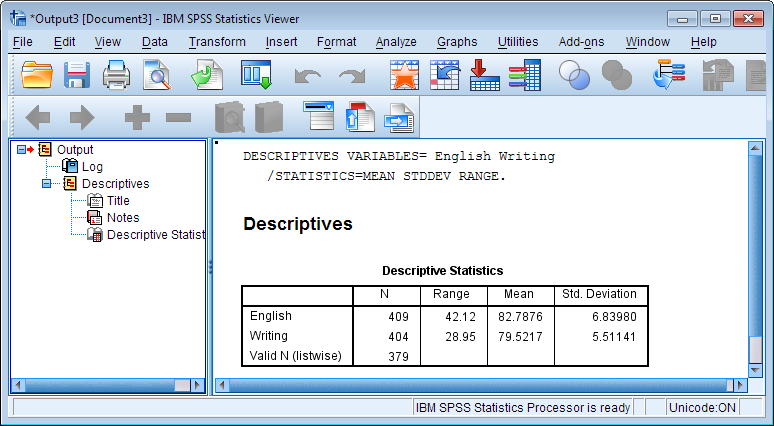Types of SPSS Dissertations|2025
Explore the different types of SPSS dissertations and find expert guidance on choosing the right methodology for your research. Get professional tips and support to enhance your dissertation.
SPSS (Statistical Package for the Social Sciences) is a versatile tool widely used in academic research for statistical analysis. Dissertations using SPSS often fall into specific categories based on the research objectives, methods, and data analysis techniques. This guide explores the various types of SPSS dissertations and provides 90 unique project ideas to inspire your research.
Descriptive Studies
Descriptive studies focus on summarizing and describing data. SPSS is used to calculate measures like means, medians, standard deviations, and frequency distributions.
Examples:
- Analyzing demographic trends in urban areas.
- Describing consumer preferences for online shopping platforms.
- Summarizing patient satisfaction with healthcare services.
Correlational Studies
Correlational studies examine relationships between variables without inferring causation. SPSS offers tools like Pearson correlation, Spearman’s rank correlation, and scatterplots.
Examples:
- The relationship between social media usage and academic performance.
- Correlating stress levels with job satisfaction.
- Analyzing the association between exercise frequency and BMI.
Comparative Studies
Comparative studies investigate differences between groups using tests like t-tests, ANOVA, or Mann-Whitney U tests in SPSS.
Examples:
- Comparing test scores between online and in-person students.
- Examining gender differences in leadership styles.
- Analyzing income disparities across age groups.
Predictive Studies
Predictive studies use regression analysis or predictive modeling in SPSS to forecast outcomes based on existing data.
Examples:
- Predicting customer churn in subscription-based businesses.
- Forecasting employee turnover rates.
- Using demographic data to predict voting patterns.
Experimental Studies
Experimental studies involve testing hypotheses under controlled conditions. SPSS helps analyze pre-and post-test data using paired t-tests or repeated measures ANOVA.
Examples:
- Testing the effectiveness of a new teaching method.
- Examining the impact of a marketing campaign on brand awareness.
- Evaluating the outcomes of an exercise intervention program.
6. Qualitative Data Analysis
SPSS is not limited to quantitative data. It can also process and analyze qualitative data through coding and frequency analysis.
Examples:
- Analyzing themes in open-ended survey responses.
- Summarizing feedback from focus group discussions.
- Exploring patterns in interview transcripts.
Mixed-Methods Studies
Mixed-methods studies combine qualitative and quantitative data analysis. SPSS is used alongside qualitative tools to provide comprehensive insights.
Examples:
- Investigating the effectiveness of hybrid learning methods.
- Analyzing customer feedback and sales data.
- Exploring employee satisfaction through surveys and interviews.
90 SPSS Project Ideas
Social Sciences
- The impact of social media on mental health.
- Gender differences in academic performance.
- Correlating parental involvement with student outcomes.
- Public opinion on climate change policies.
- The relationship between income and voting behavior.
- Analyzing urbanization trends in developing countries.
- Factors influencing job satisfaction among teachers.
- The effect of remote work on work-life balance.
- Trends in substance use among teenagers.
- Examining the prevalence of online bullying.
Healthcare
- Analyzing patient satisfaction in telemedicine.
- Factors affecting adherence to diabetes management plans.
- The relationship between physical activity and mental health.
- Analyzing vaccination rates by demographic groups.
- Trends in healthcare access across rural areas.
- Predicting hospital readmission rates.
- The impact of diet on cardiovascular health.
- Evaluating the effectiveness of mental health interventions.
- Examining the relationship between sleep patterns and productivity.
- Analyzing healthcare disparities among minority groups.
Education
- Comparing the effectiveness of online and traditional learning.
- Analyzing dropout rates in higher education.
- Correlating study habits with academic performance.
- The impact of extracurricular activities on student success.
- Examining teacher burnout rates.
- Analyzing the role of technology in enhancing education.
- The relationship between class size and student outcomes.
- Exploring factors influencing college choice decisions.
- Examining the role of parental education on student success.
- Predicting standardized test scores using demographic data.
Business
- Customer satisfaction analysis in e-commerce.
- Predicting consumer behavior using social media trends.
- Analyzing employee engagement in remote work settings.
- The impact of corporate social responsibility on brand loyalty.
- Examining trends in digital advertising effectiveness.
- Predicting sales performance based on economic indicators.
- Analyzing market segmentation for targeted advertising.
- Correlating leadership styles with organizational performance.
- Examining the impact of employee training programs.
- Analyzing the effectiveness of loyalty programs.
Environment
- Public perception of renewable energy policies.
- Analyzing the effectiveness of recycling initiatives.
- Predicting the impact of urban development on biodiversity.
- Examining the relationship between air quality and public health.
- Analyzing climate change awareness campaigns.
- The impact of deforestation on local communities.
- Trends in water usage in agricultural regions.
- Analyzing public support for conservation efforts.
- The role of eco-friendly products in consumer decision-making.
- Examining factors influencing carbon footprint reduction.
Technology
- Predicting technology adoption rates in education.
- Analyzing user satisfaction with mobile applications.
- The impact of cybersecurity training programs.
- Trends in artificial intelligence adoption in businesses.
- Correlating smartphone usage with productivity levels.
- Analyzing social media algorithms and user engagement.
- Predicting the success of new technology startups.
- Examining the effectiveness of online privacy policies.
- Analyzing the impact of wearable technology on health monitoring.
- The role of blockchain in financial transactions.
Psychology
- Analyzing the relationship between stress and performance.
- Examining the impact of mindfulness practices on mental health.
- Predicting therapy outcomes using demographic data.
- The relationship between personality traits and career choices.
- Analyzing patterns in substance abuse recovery.
- The role of gratitude in emotional well-being.
- Examining the impact of social support on depression.
- Correlating childhood trauma with adult behavior.
- Predicting academic resilience in college students.
- Analyzing the role of parenting styles on adolescent behavior.
Miscellaneous
- Analyzing sports performance using regression analysis.
- The impact of music on concentration levels.
- Predicting tourism trends using demographic data.
- Examining factors influencing charitable donations.
- Analyzing the effectiveness of public safety campaigns.
- Correlating cultural events with local economic growth.
- Predicting housing market trends.
- Examining the impact of transportation infrastructure on urban growth.
- Analyzing crime rates by neighborhood demographics.
- Trends in renewable energy adoption in urban centers.
Advanced Topics
- Predicting cryptocurrency market trends.
- Analyzing the effectiveness of AI-driven healthcare tools.
- Examining patterns in big data analytics adoption.
- Predicting the impact of remote learning on global education.
- Analyzing trends in social entrepreneurship.
- The role of machine learning in predictive analytics.
- Examining cultural differences in technology usage.
- Predicting trends in personalized medicine.
- Analyzing the future of autonomous vehicles.
- Examining the impact of 5G technology on communication.
Conclusion
SPSS dissertations offer a wide range of possibilities, from descriptive studies to advanced predictive modeling. By exploring these types and utilizing the project ideas provided, you can select a topic that aligns with your interests and contributes to your field. Whether you’re a novice or an advanced researcher, SPSS provides the tools to deliver impactful and meaningful insights.
Needs help with similar assignment?
We are available 24x7 to deliver the best services and assignment ready within 3-4 hours? Order a custom-written, plagiarism-free paper







